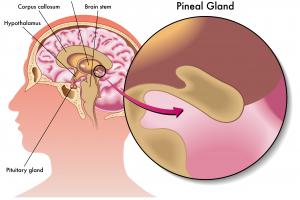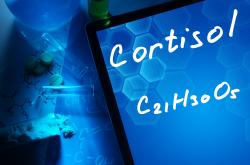The Dangers of Pineal Calcification and What You Should Do About It
The pineal gland plays a role in the natural circadian rhythm. Fatigue is just one of the results when this rhythm is disrupted. That is why it is important to understand how calcification of pineal happens and how to reverse it.

Why Pineal Gland Health is Important in Adrenal fatigue
If you thought that high cortisol levels represented the biggest danger to your natural circadian rhythm, think again. Any imbalance in the hormones that course through your brain can result in the type of dysregulation that can pose a serious risk to your health. One of the more common disruptors of the circadian rhythm has its origins in the pineal gland – that tiny gland at the center of your brain that nestles between the two hemispheres.
Because this gland lacks the natural blood-brain wall of protection that helps to shield other areas of the brain, it is more exposed to substances like fluoride. And since there is fluoride in most people’s diets, the substance can build up over time and calcify the pineal gland. Here’s why that matters: the pineal gland synthesizes and secretes the melatonin that is necessary for a well-balanced circadian rhythm. Calcification reduces the level of this hormone in ways that can throw off the natural rhythms, affect the onset of puberty for young girls, and limit the protection that melatonin usually provides against cell-attacking free radicals.
Causes of Pineal Calcification
There are many things that can cause calcification over time. These causes can generally be grouped into three main categories: chemicals, calcium (both from food and from supplementation), and various environmental factors.
Chemicals
There are three main chemicals that can affect calcification. These chemicals are fluoride, bromide, and chlorine. Collectively, they are known as halides. Of the three, fluoride represents the biggest threat – primarily due to the fact that it is so common in our diets, as well as in toothpaste and city water. Once ingested, it forms crystals that quickly grow in number, calcifying the tissues of the pineal gland and preventing it from normal activity.
Calcium
Calcium is another main source of calcification. Because it is found in most forms of processed foods, it is so common that most people never even realize they are ingesting it. And, as if that weren’t bad enough, many people also take calcium supplements as well.
Environmental Factors
The fact is that many things in our environment can add to this calcification effect here are just a few:
Calcification Threats Are Everywhere!
- Mercury. This poison is extremely bad for the vulnerable pineal gland, and is found not only in many tooth fillings but in some vaccines as well. It is also found in many forms of seafood, including tuna, shrimp, prawns, and dolphins.
- Mercury-filled light bulbs can also pose a risk if they break and the vapor escapes into the air.
- Tap water can contain fluoride and other substances that can increase the calcification effect. Try to avoid it whenever and wherever possible.
- Pesticides, such as those found on much of the fruit and vegetables in the food supply, can pose a serious risk for increased calcification. In addition, there is some concern that some meat may also be tainted via the natural food chain.
- Non-natural substances like artificial sweeteners contain chemicals that the brain is not designed to manage. Use them with caution.
Symptoms of Pineal Calcification
Many patients suffering from calcification of the pineal gland experience disrupted sleep patterns, and an intense craving for alcohol. In young girls, unnaturally early sexual development is often an indication that this gland is calcified. Most important for fatigue sufferers is the impact that melatonin can have on overall energy levels. Since calcification reduces melatonin and affects the sleep cycle, many people with this condition experience less energy during the day.
The best research now indicates that lingering fatigue is almost always a clear indicator that the pineal gland is calcified. In fact, many fatigue effects serve as obvious signs that something is wrong inside this part of the brain. Even depression offers a warning to patients that the pineal is under duress.
How to Decalcify Your Pineal Gland
Of course, none of this would matter if there were no way to address the problem. Fortunately, there are some steps that can be taken to decalcify this gland and help to restore its proper function. They include changes in diet and supplementation, as well as a few other lifestyle changes.
Dietary Changes
Remove all sources of fluoride as quickly as possible. While it may be impossible to avoid every instance of the chemical, any serious reduction can diminish the calcification effect over time. You should also focus on foods like raw chocolate, which has a high antioxidant level. Get rid of calcium-rich foods, and increase the amount of K2-rich foods you eat. That includes animal products, all of which have demonstrated success in reversing calcification in this area of the brain.
Supplements
While you want to avoid calcium supplements, you should supplement your diet with things like magnesium, vitamin D, and other vitamins that can not only restore brain health but that will also provide other crucial benefits for your entire body.
Lifestyle Changes
Get more sleep, exercise to ensure that all of your systems remain as active as possible, and work to detoxify your pineal gland on a regular basis. Boron, tamarind, iodine, and other detoxifying agents have proven quite effective at negating the effects of fluoride over time.
Some experts recommend melatonin supplementation, but as a general rule that type of hormonal help can be counterproductive. In fact, it can often lead to suppression of normal hormonal production as the body gets comfortable relying on outside help. The best option is to work to naturally detoxify the pineal with food and supplementation. With commitment and consistency, these efforts can reverse calcification, improve pineal health, and help you to restore your body’s natural balance.
You might also be interested in:
- How to decalcify the pineal gland. http://www.hangthebankers.com/how-to-decalcify-the-pineal-gland/
- Pineal Gland Calcification. http://www.med-health.net/Pineal-Gland-Calcification.html
- Causes of Pineal Gland Calcification: Natural Treatment Options. http://www.tandurust.com/health-faq-7/pineal-gland-calcification.html
- How to Decalcify and Detoxify the Pineal Gland. http://www.wakingtimes.com/2012/12/15/how-to-decalcify-and-detoxifythe-pineal-gland/
- Pineal Gland. http://fluoridealert.org/issues/health/pineal-gland/

















Leave a comment